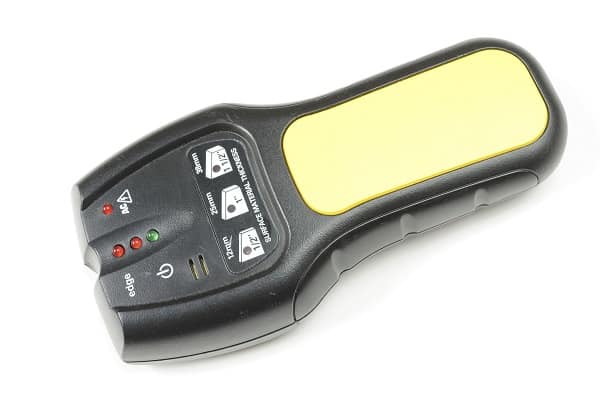Stud finders are a tool that is used to locate the wooden beams in a wall. This is useful for hanging pictures, shelves, or other objects on the wall. The cost and accuracy of stud finders can vary depending on the quality of the devices.
Some stud finders have an LED light that will indicate when it has found a stud. Other stud finders use magnets to locate the nails that are used to secure the drywall to the studs.
Let's answer some questions that might make you cogitate!
How Much Are Stud Finders?
If you're wondering how much stud finders cost, the answer may surprise you. These devices are relatively inexpensive, and they can be found at most hardware stores. While not all stud finders are always accurate, they can be a helpful tool when trying to locate studs inside your walls.
When shopping for a stud finder, you'll likely see prices ranging from $10 to $30. The more expensive models usually have more features, such as the ability to detect metal or live wires.
However, even the most basic model should be able to help you locate studs with ease.
What Do Stud Finders Look Like?
Stud finders are typically small, handheld devices that can fit in the palm of your hand. They may feature a long shaft with a blinking light at the tip, or they may look more like a flat piece of plastic with a button on it.

What Are Stud Finders Used For?
Stud finders are primarily used to help locate framing studs in walls so that you can then hang pictures or shelves, or whatever else you need to mount. They use either magnets or electronic sensors to detect the metal screws or nails that hold the drywall to the studs.
Some of the more advanced models can also find metal pipes or even wires inside walls. Other uses include locating studs in floors so that you can mount a door or other fixture.
How Do Stud Finders Work?
The working principle of stud detector is not as complicated as you think. When you push a stud finder up against a wall, it emits an electronic pulse that bounces off the wall and back to the device.
The stud finder then uses this information to determine if there's a stud behind the drywall. If a stud does exist, the unit beeps. If it doesn't sense a stud, it emits a steady tone.
How Accurate Are Stud Finders/What is The Most Accurate Stud Finder?
There are many factors to consider when purchasing a stud finder, but accuracy is perhaps the most important.
So, how accurate are stud finders? It depends on the types of stud finders. Some stud finders are more accurate than others. The most accurate stud finders use radar or sonar technology to detect studs behind walls. These types of stud finders can be expensive, but they're worth the investment if you need to do a lot of wall-mounted projects. So, electronic stud finder is the most accurate type of stud finder.
Less expensive and less accurate stud finders use magnetic sensors to detect nails or screws that are used to secure drywall to wooden studs. These types of sensors can sometimes give false readings if there are water pipes or other objects behind the wall.
There's another type of stud finder called "stud finder app". In order to use these types of stud finders, just install a stud finder app on your smartphone. Then, aim your smartphone's camera at the wall and then move your phone left and right until you see a signal on the screen. However, this type of stud finder is not that good when it comes to accuracy.

Is There a Stud Finder App That Actually Works?
Are stud finder apps accurate? Yes, there are two stud finder apps that work which are Stud detector & wall Stud finder and Stud Scanner : Stud Detector. Those stud finder apps work by using the device's camera to scan the wall for any visible studs in the wall.
They operate in a similar manner on Android devices. For these, detection ranges will vary depending on how good the applications and your phone's compass or magnetometer are and most stud finder apps always lack the more advanced features that can be provided by a professional stud finder.
But for a quick scan, these apps can be a handy tool.
What Do Stud Finders Detect?
Stud finders are designed to detect any type of stud in a wall, including wooden studs and steel studs. They can also be used to detect electrical wires and pipes, although they aren't designed for that purpose.
There are mixed reviews when it comes to stud finders and lath and plaster walls. Some say that stud finders are not accurate on these types of walls, while others claim that they work perfectly fine. Lath and plaster walls are made up of narrow strips of wood that are placed horizontally and held together with mortar. The spaces between the strips are then filled with plaster.
If you're considering using a magnetic stud finder on a lath and plaster wall, it's important to keep in mind that these devices rely on magnets to detect nails or screws that are holding the laths in place. Because the laths are made of wood, the magnet might not be able to penetrate through the entire thickness of the material. This means that the stud finder might only be able to detect the nails or screws near the surface of the wall.
Electric stud finders, on the other hand, are able to penetrate through lath and plaster walls and detect the nails or screws inside the wall. The best stud finders for lath and plaster walls are thus electric devices that use a rotating magnetic head.
Metal studs are used in many construction applications because they offer several advantages over wood studs. Metal studs are stronger, lighter in weight, and more fire resistant than wood. They are also easier to install because they don't require nails or screws for fastening.
So, do stud finders work on metal studs? The answer is yes, but there are a few things to keep in mind. First, not all stud finders can detect metal. Second, even if your stud finder can detect metal, it may not be as accurate as it is with wood.
Stud finders work by emitting a small, harmless burst of electricity. The current passes through any metal or wood it encounters in the wall and is picked up by the electronic circuitry in the stud finder. If the stud finder can detect metal, it will give you an audible and/or visual signal to indicate that there is a metal object present.
The signal will be louder or more intense if the metal object is thicker or closer to the stud finder. If your stud finder cannot detect metal, you will not get a signal at all. If the signal is weak or gets weaker as you move toward the suspected stud, there is either no metal present in that area or it is not very thick.
You might be wondering that do stud finders work on ceilings. Yes, a stud finder can find ceiling joists. If you're looking for the joists in your ceiling, a stud finder is a tool that can help you locate them.
There are also different features that electric stud finders offer. Some have sensors that help to identify the edges of the joists, while others have LCD screens that show the location of the joists. Generally speaking, stud finders are quite accurate when it comes to finding ceiling joists.
Many electric stud finders have the capability to detect live wires. Some stud finders have a separate probe for live wires, but many are equipped with an integrated feature that allows you to detect electric wires.
This additional feature is very useful in areas where wires are concealed in walls, ceilings and floors. It can save you from drilling through a high-voltage electric cable and getting electrocuted.
In fact, some multi-purpose stud finders are equipped with the ability to detect water pipes. This is a useful feature for people who are renovating their homes or installing plumbing in areas where water pipes are concealed behind walls.
Although it is possible to find water pipes using a stud finder, the results may not be accurate as water pipes are usually made from plastic, which is generally not detected by a typical stud finder.
Yes, it does. However, there are many factors to consider when looking for a stud finder that will work through tile.
The first is the type of tile. Some tiles, such as ceramic, are harder than others and may not be as easily penetrated by the stud finder. The second factor is the thickness of the tile. Thicker tiles will also be more difficult for the stud finder to penetrate.
The third factor is the type of stud finder you are using. Magnetic stud finders will work through tile but may not be accurate because there will be no metal to help guide the tool. Electric stud finders, however, should be able to easily locate nails or screws that are holding the tile in place.
It is possible to use a stud finder through 2-3 layers of plywood. However, if you have more than 3 layers of plywood, the results may be inaccurate because the stud finder may not be able to penetrate that many sheets of wood.
Final Words
Stud finders are an important tool for all homeowners. Not only will they help you find the studs in your wall, but they can also be used to locate pipes, joists and electrical wires. This type of tool is a must-have and worth the investment because it is not only inexpensive but also very handy.
A stud finder can save you a lot of time and energy. If you’re not sure which stud finder to buy, or if there is any difference between them in terms of quality and price, then please check out my reviews of the best stud finders on the front page.
